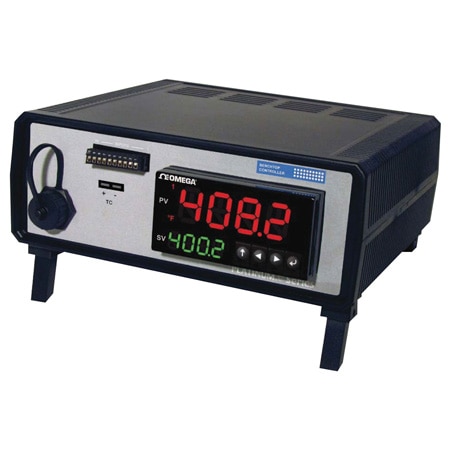PST joins DwyerOmega. Read more>

| Quantity | Price each |
|---|---|
| 1-9 | $1,176.89 |
| 10-24 | $1,118.05 |
| 25-49 | $1,059.20 |
| 50-99 | $1,000.36 |
| 100-499 | $941.51 |
| 500+ | $882.67 |
Edit these specs to order a different model. Not all combinations are valid. Options compatible with previous selections will be in bold.
*Highlighted options are not compatible. Please select a different combination.
Power cord is not included, please see the accessories tab to purchase the appropriate cord for your region.
The OMEGA™ CS8DPT/CS8EPT is a portable benchtop digital controller and with a large color-changing display. This benchtop controller features 4 Digit dual LED or 6 Digit displays that can be programmed to change color between Green, Amber, and Red at any setpoint or alarm point. Other options include, serial communications, and Ethernet.
This universal temperature and process instrument handles 10 common types of thermocouples, multiple RTDs,thermistors and several process (DC) voltage & current ranges, and strain type of inputs.
Specifications
Accuracy: See table on Spec Sheet for details
Resolution: 1°/0.1°; 10 µV process
Temperature Stability:
RTD: 0.04°C/°C
Thermocouple: 25°C (77°F); coldjunction compensation of 0.05°C/°C
Process: 50 ppm/°C
CMRR: 120 dB
A/D Conversion: Dual-slope
Reading Rate: 20 samples per second
Digital Filter: Programmable
Display: 4-digit or 6-digit, 9-segment LED; Red, Green, and Amber, and programmable colors for process variable, setpoint and temperature units
Input Types: Thermocouple, RTD, thermistor, analog voltage, analog current and strain
Thermocouple Type (ITS 90): J, K, T, E, R, S, B, C, N, L
RTD Input (ITS 68): 100/500/1000 Ohm Pt sensor; 2-, 3- or 4-wire; 0.00385 or 0.00392 curve
Thermistor Input: 2252 Ohm, 5K Ohm, 10K Ohm
Voltage Input: 0 to 100 mV, 0 to 1 Vdc, 0 to 10 Vdc
Input Impedance: 10 MO for 100 mV, 1 MO for 1 or 10 Vdc
Current Input: 0 to 20 mA (5 O load)
Strain Input: 0 to 50, 0 to 100 mV
Configuration: Differential
Polarity: Bipolar
Decimal Selection: None or 0.1 for temperature; None, 0.1, 0.01 or 0.001 for process
Control Output: 5A SSR (internal), 3A relay max, analog process output
Excitation: Firmware selectable to 5, 10, 12, and 24Vdc @ 25mA
Network and Communications
Ethernet: Standards compliance IEEE 802.3 10 Base-T
Supported Protocols: TCP/IP, ARP
RS232/RS485: Selectable from menu; both ASCII and Modbus protocol selectable from menu; programmable 1200 to 115K baud; complete programmable setup capability; program to transmit current display, alarm status, min/max, actual measured input value and status
Connection: USB, Ethernet (option), Series (option)
General
Power: 90 to 240 Vac, 50 to 60 Hz
Dimensions: 236W x 230D x 108mmH (9.3'x9.1'x4.3')
Weight:1.13kg (2.5lb)
Embedded Internet
This OMEGA benchtop devices can serve Web pages over an Ethernet LAN or even over the Internet, making it possible to monitor and control a process through a Web browser (such as Microsoft Internet Explorer®) from anywhere in the facility or anywhere in the world.
Remote Control
For example, using an CS8DPt Series temperature controller to control a heater, an engineer can monitor the temperature, change setpoints or alarm points, turn the heater on and off, or make other modifications from anywhere on the local network or anywhere on the Internet. The Web pages are easily customized, and secure, password protected access to the devices is easily controlled. And it requires absolutely no special software on the engineer’s computer to view the data and “supervise” the controller— nothing other than a Web browser.
E-Mail and Alarm
In fact, the Cs8DPt controller can even send an e-mail to the engineer (or anyone he or she chooses) about an alarm condition or to update the status. Leveraging the technology of the Internet, the engineer could receive a message from the controller on an Internet-enabled pager or cell phone.
Most remarkable is that all this can be accomplished without a computer. The OMEGA™ CS8DPt controller with fully loaded communication options connects directly to the Ethernet network—not to the serial port of a computer functioning as a “server” and “master” to “slave” instruments connected through serial communications. With the loaded C24 option, these devices are also available with RS232 and RS485, and MODBUS serial communications.